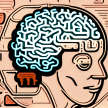The Grandfather Paradox
Unraveling the Conundrums of Time Travel

The concept of time travel has long fascinated humanity, fueling countless tales of adventure and exploration. However, one particular paradox stands as a significant challenge to the possibility of traversing through time: the Grandfather Paradox. This intriguing conundrum explores the implications of traveling back in time and potentially altering events in a way that would make one's own existence impossible. In this article, we delve into the intricacies of the Grandfather Paradox, examining its philosophical and scientific implications while pondering the potential resolutions to this timeless puzzle.
Understanding the Grandfather Paradox:
The Grandfather Paradox poses a thought experiment that revolves around the idea of traveling back in time and encountering a situation that would make one's existence impossible. The paradox gets its name from the classic scenario involving a time traveler who goes back in time and kills their own grandfather before their parent is conceived. This act would seemingly create a contradiction: if the time traveler's grandfather never had children, then the time traveler's parent would never be born, and subsequently, the time traveler themselves would never exist to go back in time and commit the act.
The Grandfather Paradox highlights the inherent complications and logical contradictions that arise when contemplating changes to the past. It challenges the notion of causality, raising questions about the nature of time, free will, and the consequences of altering events.
Exploring Potential Resolutions:
Resolving the Grandfather Paradox has been a subject of speculation and debate among physicists, philosophers, and science fiction enthusiasts. Various theories and potential explanations have been put forth to reconcile the logical contradictions presented by the paradox. Here are some of the proposed resolutions:
1) Self-Consistency Principle: One possible resolution suggests that the universe has an inherent self-consistency mechanism that prevents paradoxes from occurring. According to this principle, any attempt to alter the past would result in events aligning in a way that preserves the consistent timeline. In the case of the Grandfather Paradox, the time traveler's actions would be thwarted or redirected in a manner that maintains the existence of the time traveler and their family line.
2) Multiple Timelines/Parallel Universes: Another solution posits that time travel creates branching timelines or parallel universes. When the time traveler alters the past, they would create a new timeline separate from their own. In this scenario, the time traveler would exist in the altered timeline where their actions caused changes, but their original timeline and existence would remain intact. This interpretation allows for the coexistence of multiple timelines with different outcomes.
3) Novikov's Self-Consistency Principle: Named after physicist Igor Dmitriyevich Novikov, this principle suggests that any action taken by a time traveler in the past would be inherently self-consistent, preventing paradoxes. According to this view, the time traveler's actions would inevitably lead to events that ensure their own existence. It implies that time travel is constrained by predestination, and any attempt to change the past would ultimately fail.
4) Retrocausality and Quantum Mechanics: Some theories within the realm of quantum mechanics propose that retrocausality, the influence of future events on the past, may provide a solution to the Grandfather Paradox. These theories challenge the traditional view of causality, suggesting that events in the future can affect events in the past. According to this perspective, a time traveler's actions in the past would be consistent with the events that would unfold in their future, avoiding any paradoxes.
The Grandfather Paradox continues to captivate our imagination, posing profound questions about the nature of time and the possibilities of altering the past. While no definitive resolution has been universally accepted, the proposed explanations and theories offer intriguing perspectives on the paradox. Whether through self-consistency mechanisms, multiple timelines, predestination, or unconventional notions of causality, these proposed resolutions attempt to reconcile the logical contradictions inherent in the Grandfather Paradox.
As science and our understanding of the universe evolve, it is possible that new insights and theories will emerge, shedding further light on the enigma of time travel and the paradoxes it presents. The Grandfather Paradox stands as a testament to the intricacies of time and the complex interplay between cause and effect.
Ultimately, the resolution of the Grandfather Paradox may lie beyond the reach of our current knowledge and may forever remain in the realm of speculation and exploration. Nevertheless, the paradox continues to inspire scientific inquiry, philosophical contemplation, and the imaginative landscapes of fiction, reminding us of the fascinating mysteries that lie within the fabric of time itself.
About the Creator
Abdul Rehman
A new content writer with fresh articles and stories to entertainment the audience and to give them factual information. There will be varieties of different topics to read and people will learn new things from me






Comments
There are no comments for this story
Be the first to respond and start the conversation.